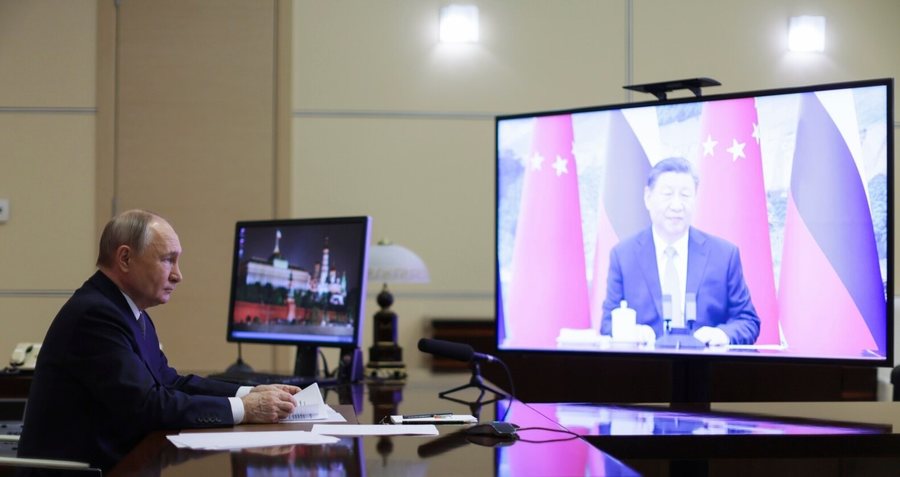
Three years after Russia's aggression against Ukraine began, China is closely watching U.S. President Donald Trump's strategy to end the war. Meanwhile, Beijing is calculating its moves to position itself as a strategic partner for Ukraine while maintaining a borderless partnership with Russia, according to experts and former officials.
British Prime Minister Keir Starmer and French President Emmanuel Macron will hold separate meetings in Washington this week, following direct talks on February 18 between senior American and Russian officials in Riyadh, Saudi Arabia, A2 reports.
President Macron met with President Trump on Monday at the White House, a meeting that lasted nearly two hours. The two discussed Ukraine via video link with other leaders of the Group of Seven (G7) major economies.
Also on Monday, Chinese President Xi Jinping spoke with Russian counterpart Vladimir Putin, who briefed President Xi on the Riyadh talks and reaffirmed the “comprehensive strategic partnership” between Russia and China. A Chinese statement said: “China welcomes the positive efforts made by Russia and relevant parties to resolve the crisis.”
Crisis, but not war
For three years, Chinese officials have said that Beijing “will play a constructive role” in providing a “political solution to the crisis,” refraining from using the term “Ukraine war” to describe Russia’s aggression since February 24, 2022.
Beijing also positively assessed the recent US-Russia talks, during which Ukraine was not present.
China and Ukraine “established a strategic partnership in 2011. In recent years, China has been Ukraine’s largest trading partner,” Chinese Foreign Minister Wang Yi told Ukrainian counterpart Andrii Sybiha on February 15 as they attended the Munich Security Conference.
"Regarding the Ukrainian crisis... China has always worked for peace and sought talks," Wang said. China's statement did not mention Ukraine's sovereignty or territorial integrity.
On February 20, two days after the U.S.-Russia talks, Foreign Minister Wang met with Russian Foreign Minister Sergey Lavrov on the sidelines of the G-20 ministerial meeting in Johannesburg, South Africa. Lavrov briefed his Chinese counterpart on the Riyadh talks. Wang reaffirmed China’s “comprehensive strategic partnership” with Russia.
Minister Wang said China "supports" all peace efforts, including "the recent consensus reached between the United States and Russia" in Riyadh.
Talks, not negotiations
US Secretary of State Marco Rubio said the talks in Riyadh, the first between Washington and Moscow in years, were not negotiations aimed at reaching any agreement on Ukraine, despite concerns from Kiev and European countries that they were being sidelined.
He said the talks were aimed at determining whether the Russians were serious about ending the war.
In a measured tone, Secretary Rubio characterized the talks, which lasted more than four hours, as steps toward establishing “lines of communication” on bilateral issues between the United States and Russia. The goal of these efforts is to achieve “some normality in our missions and their ability to function.”
Some analysts said Beijing is concerned about warming US-Russia relations.
"While a full rapprochement may not yet be in the cards, they are concerned because if President Trump lifts sanctions on Russia, then Moscow's dependence on China will decrease," Dennis Wilder, a White House adviser on China during the administration of President George W. Bush, told Radio Free Europe.
Meanwhile, other experts warned that with its stance, Washington risks strengthening China's propaganda, which portrays Washington as an unreliable ally.
Retired US Admiral Mark Montgomery, a defence analyst at the Washington-based Foundation for Defense of Democracies (FDD), said: “We immediately lost the advantage we could have had” and “misidentified who the aggressor was” as they rushed into talks with the Russians.
China, "faced with this good news," is certainly reaping the benefits, Mr. Montgomery said at a conference organized by FDD.
"I have no doubt that diplomats from China are whispering to others around the world about the unreliability of Americans, and unfortunately, this administration is giving them some arguments for that," said Bradley Bowman, director of the Center for Military and Political Power at FDD, during the conference.
Skeptical experts
A Chinese Foreign Ministry spokesman declined to comment on whether China would consider sending peacekeeping forces to Ukraine after the conflict ends.
Presidents Xi and Putin are scheduled to exchange visits to Moscow and Beijing later this year. The two held a virtual meeting on January 21. President Xi also spoke by phone with his Russian counterpart Putin on the afternoon of February 24.
Some former U.S. officials are skeptical about the extent to which the Chinese government is truly willing to act to stop Russia's war against Ukraine. They believe China could use the issue to its advantage in its relations with President Trump.
"I think the Chinese when it comes to Ukraine will offer little help to Mr. Trump. They won't do much and then claim they've achieved success," said Evan Medeiros, director of the Asian Studies programs at Georgetown University.
"Anything that is in their interest, such as helping to rebuild Ukraine, they will accept. However, this is not about encouraging Russia to make peace. This is about securing big contracts for their infrastructure companies," Mr. Medeiros added./ Voice of America (A2 Televizion)











